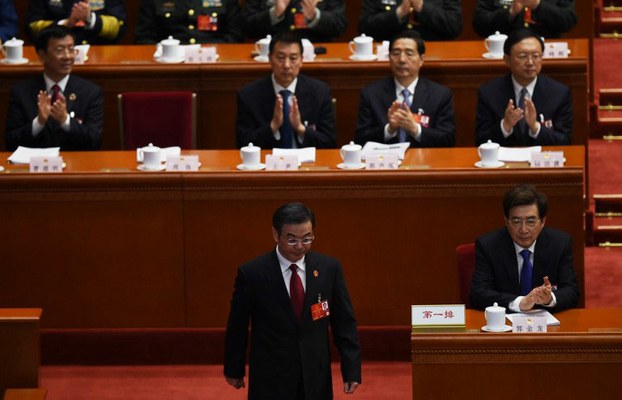China: Calls grow for top judge to resign after judicial independence comments
| Publisher | Radio Free Asia |
| Publication Date | 20 January 2017 |
| Cite as | Radio Free Asia, China: Calls grow for top judge to resign after judicial independence comments, 20 January 2017, available at: https://www.refworld.org/docid/58f9ca7da.html [accessed 21 May 2023] |
| Disclaimer | This is not a UNHCR publication. UNHCR is not responsible for, nor does it necessarily endorse, its content. Any views expressed are solely those of the author or publisher and do not necessarily reflect those of UNHCR, the United Nations or its Member States. |
2017-01-20
 Zhou Qiang, President of the Supreme People's Court, prepares to deliver his work report to the National People's Congress in Beijing, March 13, 2016. AFP
Zhou Qiang, President of the Supreme People's Court, prepares to deliver his work report to the National People's Congress in Beijing, March 13, 2016. AFP
More than 70 academics and writers have penned an open letter calling on the head of China's Supreme People's Court to resign, citing his refusal to acknowledge the principle of judicial independence.
"The only job of a judicial official is to safeguard the law, which should be held sacred," the letter said.
"As the head of the Supreme Court, Zhou Qiang has refused to accept the universal principle of judicial independence, however, labeling it a 'Western' idea," the letter said.
"This challenges the universal consensus that is shared by all of humanity," it said. "This has created ideological confusion."
"Such a supreme court chief has to go, or risk making a mockery of Chinese law, and ... undermining public confidence in the rule of law."
The chorus of criticism, which includes that of prominent Chinese legal scholars, follows reports in the state-controlled media quoting Zhou as saying that judicial independence is "an erroneous Western ideal."
Zhou had been seen as a reformer keen on limiting the influence of government officials on local courts.
Seven taboos of Xi
But he was recently quoted as telling top judges to "unsheathe their swords" in defense against words and actions that run counter to the ruling Chinese Communist Party's central tenets.
Judicial independence was named as one of seven "taboos" in an internal party ideological directive issued in 2013, shortly after President Xi Jinping took power.
Other "taboos" included press freedom, civil society, citizens' rights, the historical mistakes of the Chinese Communist Party and talking about the financial and political elite.
The letter has garnered more than 70 signatures since it was published on Wednesday, signatory Mao Yushi told RFA on Friday.
"The judiciary must be independent," Mao said. "It can't be subject to external interference; judges must be free to act according to their own consciences."
"This is common sense; it doesn't need any specialist knowledge to understand."
"How can the courts uphold justice if they are subject to external influence?"
Integrity battered
Mao said the integrity of the Supreme Court had taken a battering with the indictment of former vice president Xi Xiaoming for taking bribes.
Prosecutors have also accused Xi of having taken 39 million yuan (U.S.$5.7 million) in stock in a tech company for using his influence to help get the firm listed on a Shenzhen stock market.
"First, investigations reveal that the vice president is corrupt, and now we have a president who doesn't believe in judicial independence," Mao said.
"I think it would help the rule of law in China for everyone to get together and ask him to step down."
Hangzhou-based writer Zan Aizong said judicial independence is enshrined in the constitution of the People's Republic of China.
"[Courts] are forbidden to allow interference from corporations, non-government groups or government agencies and departments," Zan said.
"[Zhou Qiang] has repudiated the notion of judicial independence, saying it is a Western idea," he said. "He has no respect for the constitution, which he is distorting, even trampling underfoot."
Reported by Goh Fung for RFA's Cantonese Service, and by Xiao An for the Mandarin Service. Translated and written in English by Luisetta Mudie.
Link to original story on RFA website
